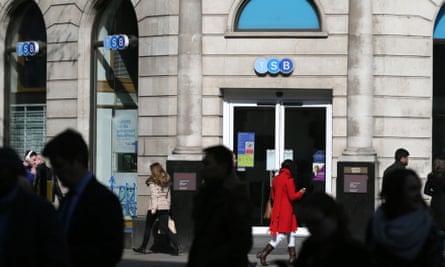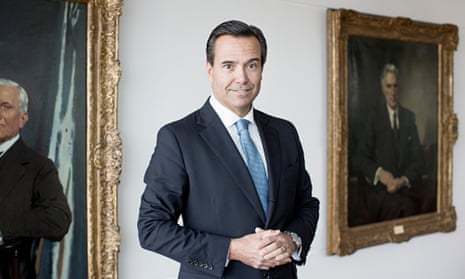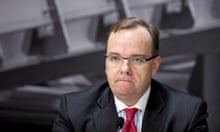A union jack cushion is plumped up on the white leather sofa, a white teapot is on the desk and there is a view to St Paul’s cathedral. The office belongs to Portuguese banker António Horta-Osório, and his mission, he says, is “to help Britain prosper”.
Known to his staff as Horta or AHO, the 51-year-old has been at the helm of Lloyds Banking Group – bailed out with £20bn of taxpayer cash in 2008 and still one-fifth publicly owned – for the last four years.
He now considers the UK – where he is member of Queen’s tennis club and chair of the Wallace Collection (the appointment letter signed by David Cameron is on display in the office) – as a home from home.
“I think the British people with their self-deprecating style – being humble and wanting to do better – do not see how good they are,” he says. Our other outstanding qualities, he says, are tolerance and a sense of fairness.
He is no doubt hoping that these characteristics will mean a ruckus can be avoided over his £11.5m pay packet - which has to be approved at the bank’s annual meeting on 14 May, just a week after the general election. He clearly reckons he is worth the money: “I hope that people will judge pay for performance,” he says.
While some bosses shirk from defending their personal pay deals, Horta-Osório – whose 10-strong management team cashed in on £23m through the same bonus scheme – does not.
The bank’s stock-market value has increased by £30bn over the period, he says. Since his 1.3m bonus shares were awarded, the share price has climbed higher, from 34.7p to 79p, increasing the value of the payout still further.
The turnaround story on AHO’s watch – even though it is not complete – also includes the return of dividend payouts to shareholders for the first time since the crisis. It is a performance in stark contrast to that of bailed-out rival Royal Bank of Scotland, where the government has yet to sell any of its 79% stake. As of this week, taxpayers own just 22% of Lloyds – down from 43% at the time of the bailout.
But it might not have worked out this way. Horta-Osório was written off by some in November 2011 when, just six months after taking over, he was forced to take two months off to recuperate from fatigue.
It was a very public setback for a man who is so driven that when he broke his right wrist aged 30 he taught himself to write and play tennis with his left hand rather than ease up temporarily on work or play. While a student, he re-sat his tax exams so he could improve his already high score. For pleasure, he scuba dives with sharks.
What drives him? He reckons it was his Jesuit education: “That had an influence. Jesuits are a great school in terms of being humble, austere, dedicated, hard-working. I think life is a marathon and resilience is one of the most important features, ” he says.
Except that by the end of 2011, Horta-Osório’s tough approach had deserted him. He was exhausted, but unable to rest. After five days without sleep, he checked himself into the Priory clinic to recover from “fatigue”: and the experience, he says, “has made me much more resilient”.
Looking back to that experience, he is reluctant to speak about the problem or the cure, but likens running a bank on the brink to captaining a sinking ship. Both, he explains, need their leader in charge at all times: “If you have a boat letting in water in the middle of a storm, you had better be at the wheel. If you fix your boat and you are in blue skies and no waves, you can go to sleep and leave somebody else at the wheel.”
He has since rationalised his working life: he has fewer people reporting to him, chairs fewer internal committees, no longer convenes meetings on Sundays and tries not to look at emails after 8pm.
When he took the helm, he recalls, the bank was in a dire position. It had £300bn of debt, half of which was on very short repayment schedules. It was in the middle of the eurozone crisis, and the bank was over-extended in 30 countries.
Now he has retrenched: Lloyds operates only in six countries and 95% of the business is in the UK: focused, as he puts it, on families and small businesses. The debt position has also stabilised.
His well-rehearsed patter about his record does not mention the toll on jobs. Some 30,000 staff were already lined up for the axe following the rescue of HBOS at the height of the 2008 banking crisis. Horta-Osório took out another 15,000 under his first three-year plan. His latest plan involves another 9,000 job losses, along with 50 branches a year. “Unfortunately, we had to lower the number of people,” he says, in something of an understatement, adding that he used redeployment and natural turnover as much as possible.
His latest three-year plan – outlined in October – involves cutting another 200 branches as more of Lloyds’s banking services move online.

The banker, who learned his trade at Goldman Sachs and spent time in Portugal, Spain, the US and Brazil before arriving in the UK 10 years ago – says that if he had been running Lloyds in 2008 he would never have taken over the near-bust HBOS. At the time, he was running Santander’s UK arm, and he did take over struggling rivals during the crisis, including Bradford & Bingley, but only the branches and clients: he left their toxic mortgage books for the government to nationalise.
Earlier this month, Spanish bank Sabadell agreed a £1.7bn takeover of TSB, the bank created from 631 branches that were carved out of Lloyds under the terms imposed by the EU at the time of the bailout. The Portuguese banker – who points out it cost £1bn more to perform the separation, in line with EU orders, than the new bank is now worth – always thought TSB, with its 4.6% share of current accounts and, unusually, more deposits than loans, would attract an offer.
He also hopes it will be a strong bank – if only to appease the politicians. Labour has talked about creating two new banks on the high street to boost competition. Moreover, the Competition and Markets Authority has already embarked on an 18-month investigation into the sector, which could ultimately be bad news for Lloyds because the bank still has a 25% share of current accounts even after the TSB disposal.
Horta-Osório, however, insists he is more concerned about improving competition in the small business market than in personal banking.
With the reputation of the banking industry continuing to take a battering – most recently HSBC has been back in the headlines after the Guardian and other publications published details of its Swiss arm helping customers avoid tax – Horta-Osório believes there will always be mistakes: “I say to my people … the only person who does not miss a penalty is the one who never plays football. Even Ronaldo and Messi miss penalties: fortunately, they miss one out of 10 or 100. It is human to err: to be human is to make mistakes.”
Lloyds has paid some huge fines and penalties for its huge, past mistakes. It was fined £28m for using a bonus scheme that put staff under so much pressure to meet targets that they sold products to themselves. There was also a £226m fine for rigging Libor and a £4.3m punishment for being slow to make payouts for mis-sold payment protection insurance. But, Horta-Osório says, he is instilling a new culture, one where people must try to do the right thing.
It was he who kicked off the huge PPI compensation movement, which has now totalled more than £20bn across the banking business. After a legal battle that pre-dated Horta-Osório’s arrival, the Lloyds boss unexpectedly gave up the fight in March 2011 and set aside more than £3bn to cover the expected bill. But the impact was far bigger than that. The bill at Lloyds has now mushroomed to £12bn, but Horta-Osório insists he has no regrets in terms of the cost to shareholders: “It was about doing the right thing.”
There have been rumblings that AHO might be ready to move on once the government stake is gone. Osborne, in his last budget of this government, outlined plans to sell another £9bn shares – which would take the taxpayers’ stake down to 7% next year if the Tories form the next government. And Horta-Osório expects Labour to follow a similar policy of selling down the stake.
But for now, his mind is on his new business proposal: “I am just starting the new three-year plan. It’s a new plan: it’s a new job.”





Comments (…)
Sign in or create your Guardian account to join the discussion